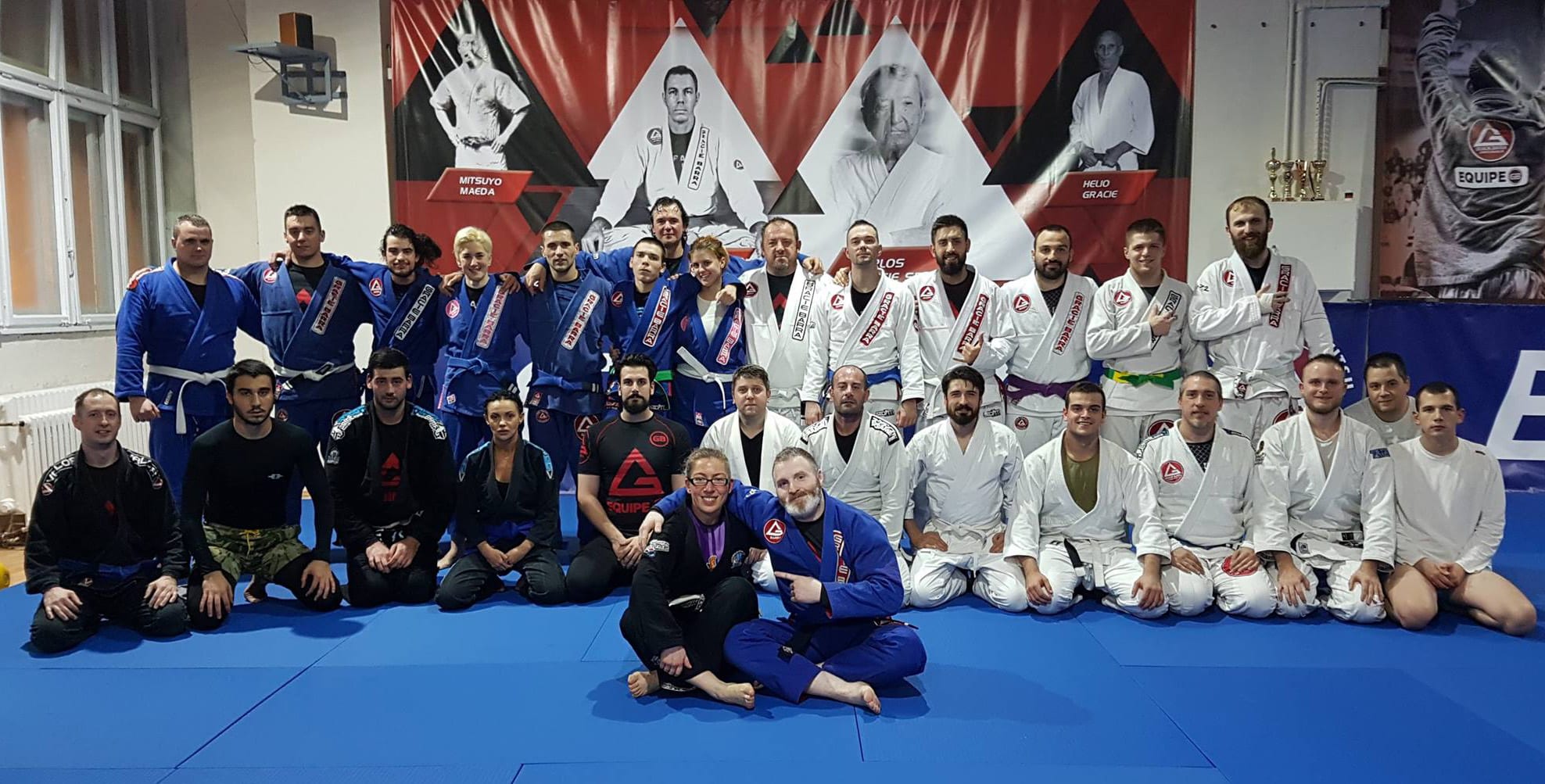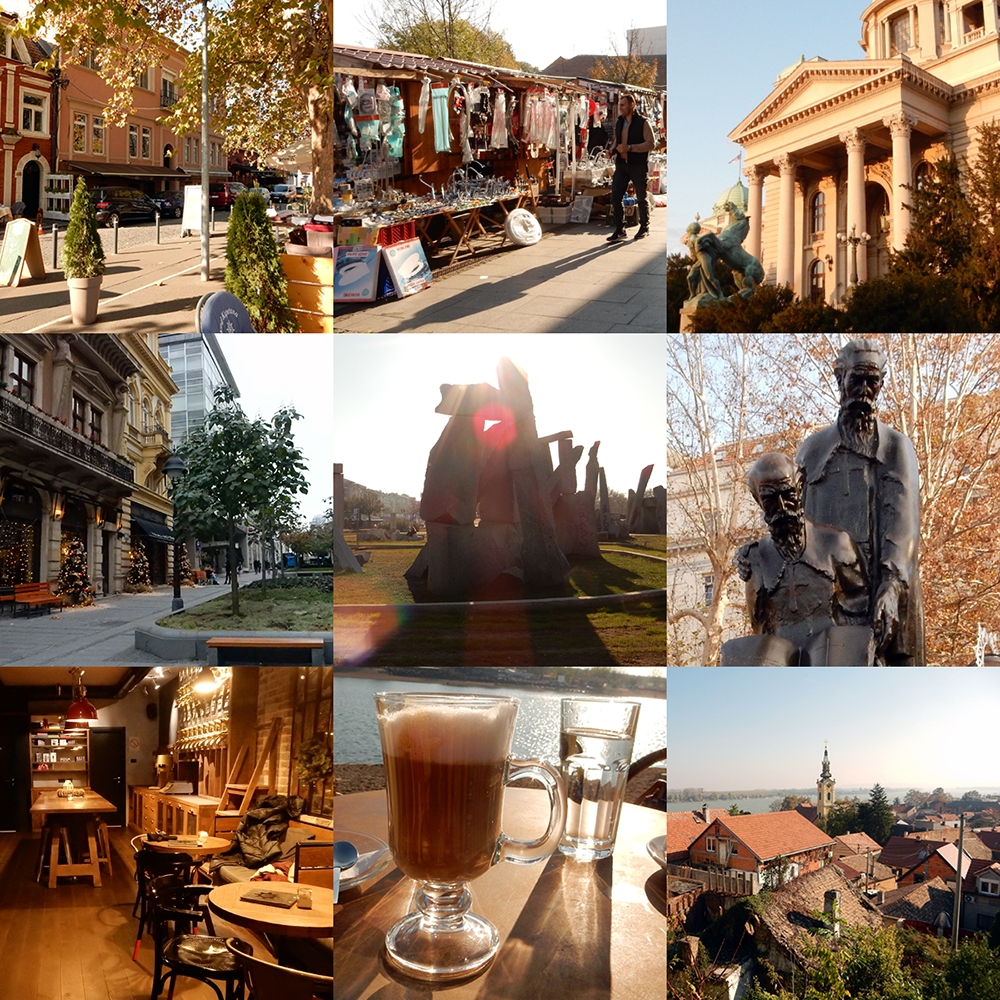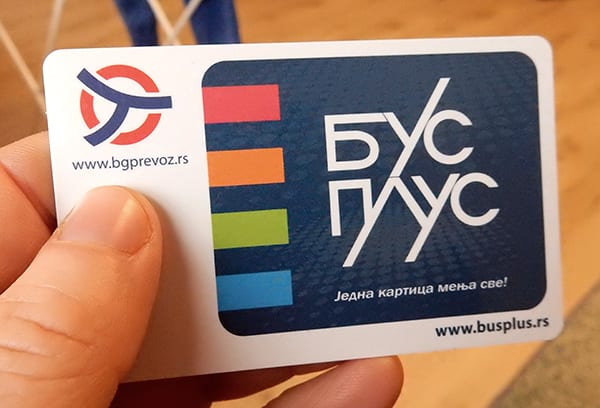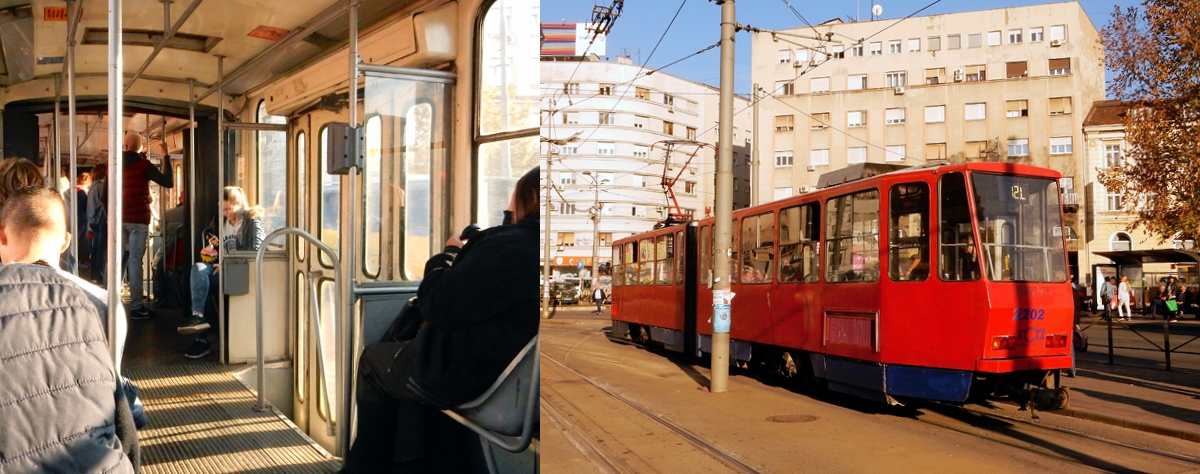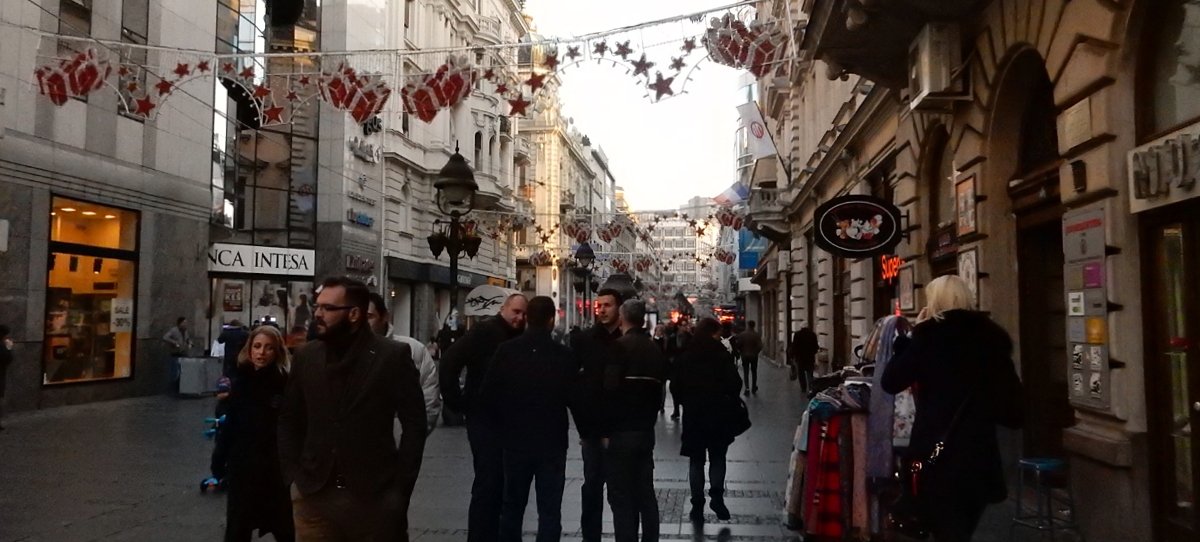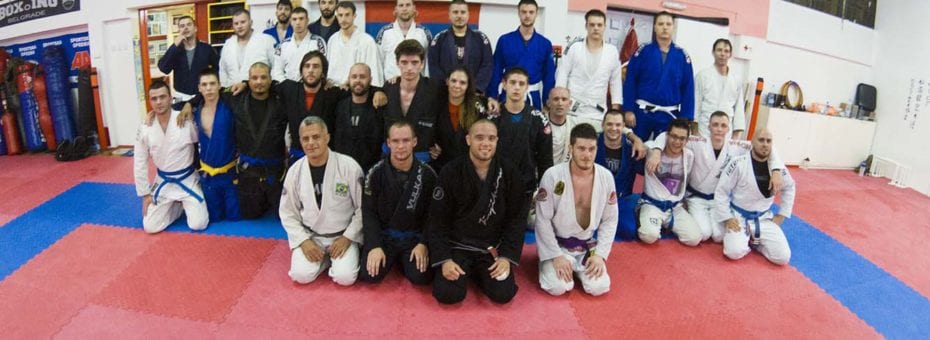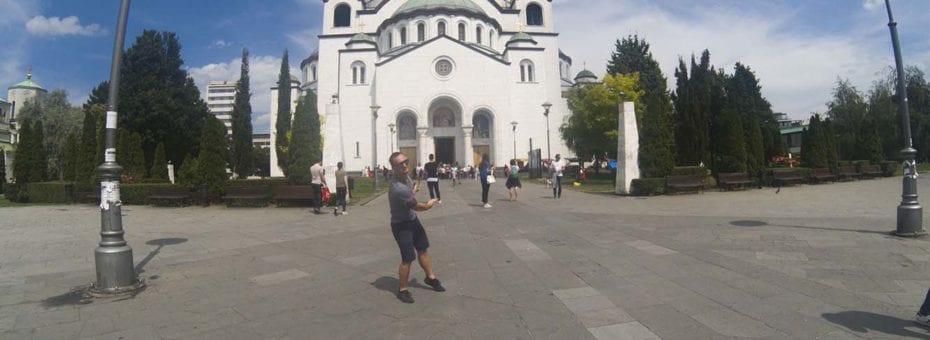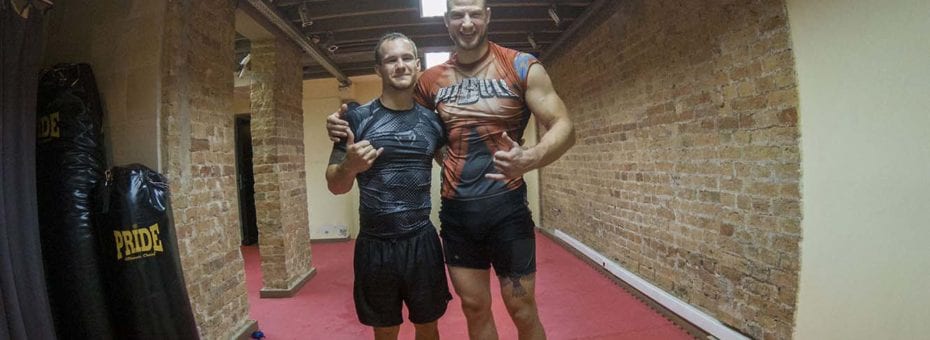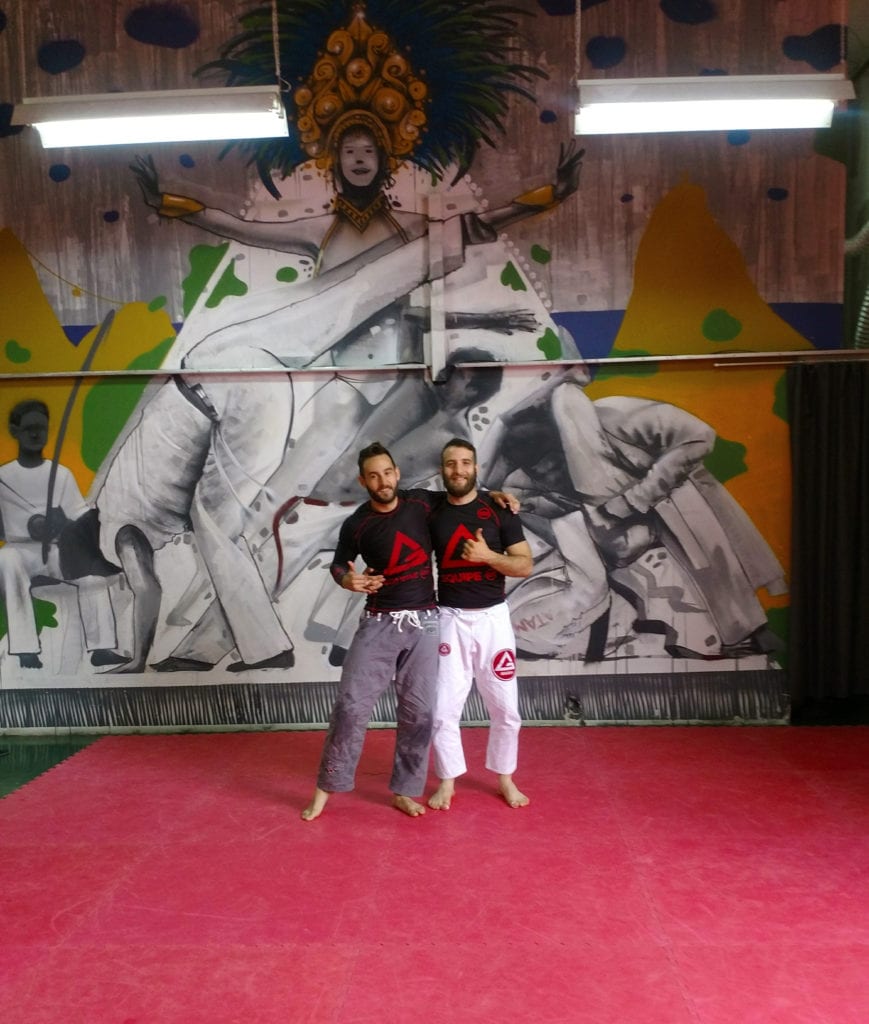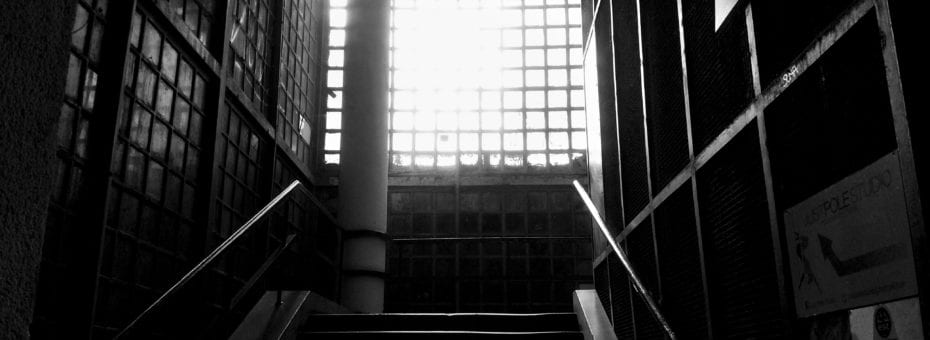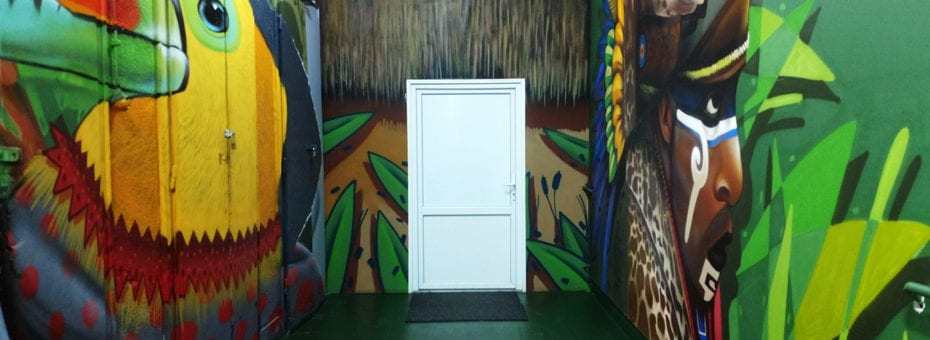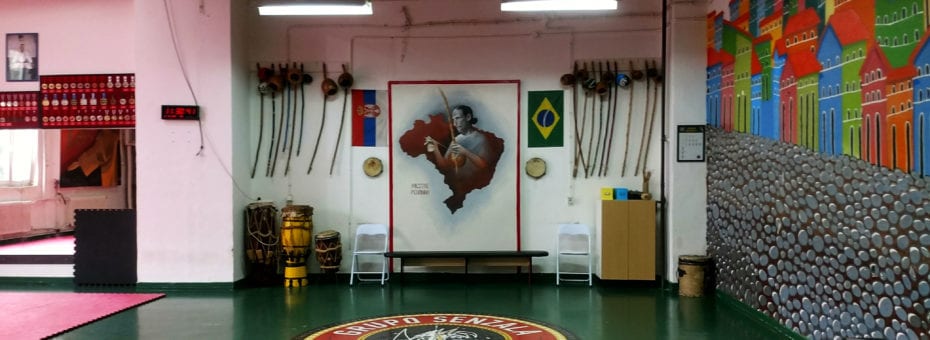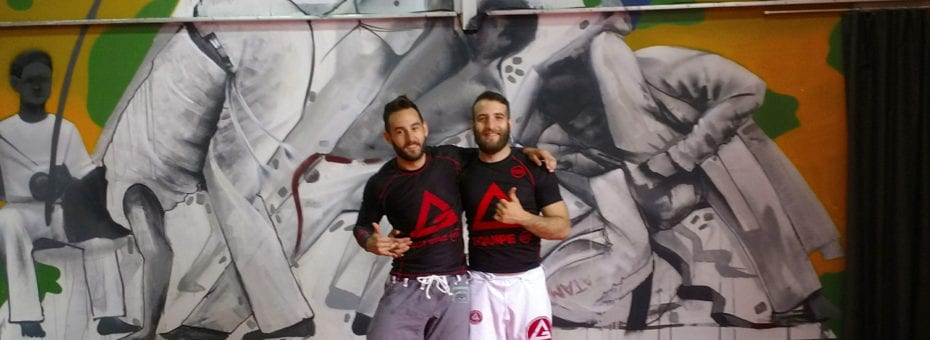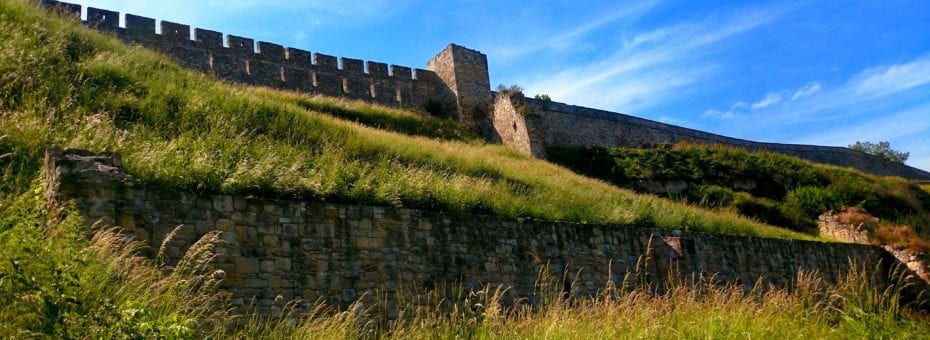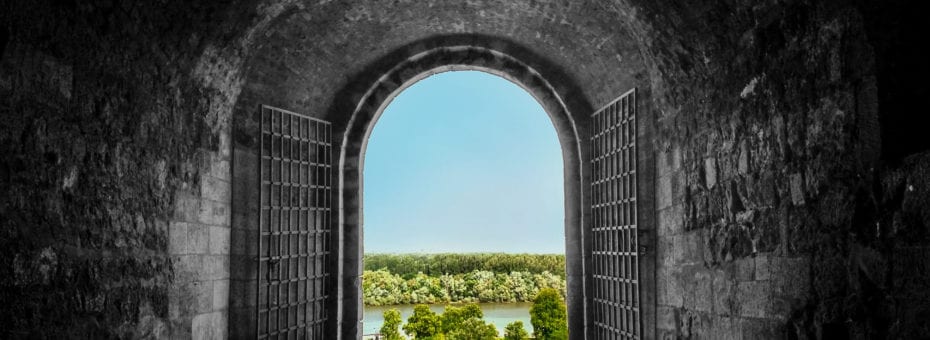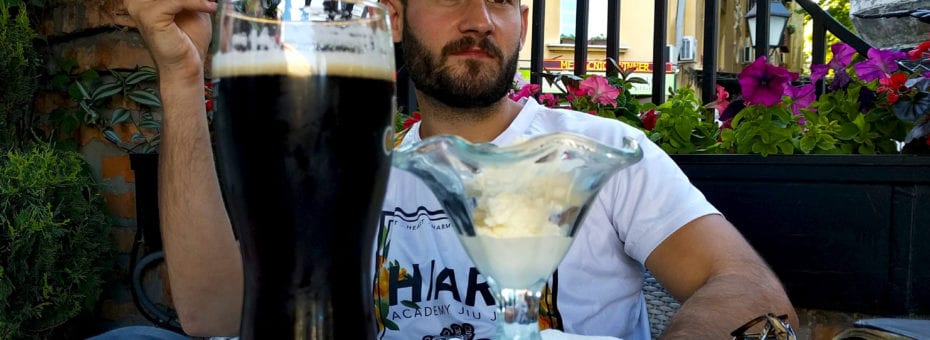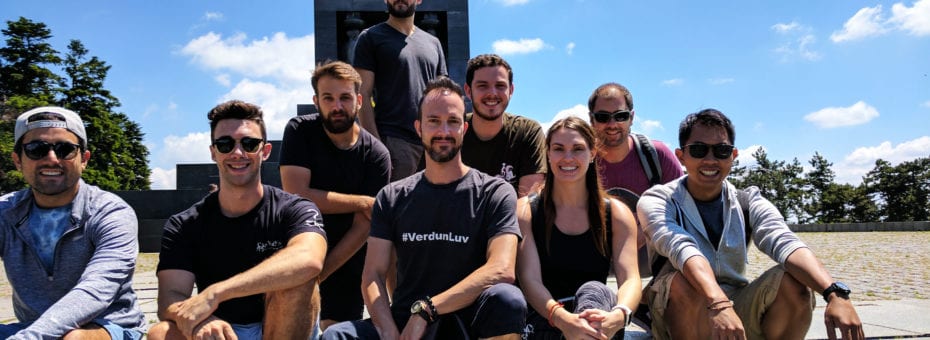November in Belgrade, Serbia
Reasons to go: Very affordable, many BJJ gyms, many English speakers, great food/pastries, grand churches, very friendly/kind people, safe for solo female travelers, big city convenience, fast wifi, good public transportation, open air markets
It’s a challenge for me to describe Belgrade. It certainly has an Eastern European vibe, but beyond that is a combination of many thing not too extreme in any one specific direction. Belgrade isn’t so much a tourist city as a living city. It has all the modern conveniences you’d expect from a big city, but also a rich cultural heritage, many historical sites, and more than a handful of very well maintained churches of various sized with grand interiors still in use throughout the city.
Many of Belgrade’s more ancient buildings and tram cars are still fully functional and active today, as if the city took an overall “if it’s not broken, keep using it” approach to their infrastructure. Tall modern buildings with spotless glass windows and ornate facades aren’t far from much older structures of plain concrete and stone, sometimes a little shabby and in need of renovations, with a fair amount of graffiti.
Throughout all of that is a liveliness, warmth and rich vibrancy that comes from the people. It’s felt in the bright markets full of shoppers, packed tram cars crowded with pedestrians going about their everyday business, and groups of friends relaxing in cozy cafes. Serbian people are SO kind! They’re open and welcoming, smile and start conversations easily, don’t hesitate to volunteer information if you look lost, and are happy to tell you about their city and to share their culture. Despite the occasionally gritty appearance of some neighborhoods, Belgrade overall is a very safe city. Even late at night there are women and people of all ages moving about, I felt perfectly at-ease exploring the city as a solo female traveler.
Arriving in Belgrade
 I arrived in Belgrade on a long-distance bus from Budapest. The route about 7 hours long (including a ½ hour break at a roadside restaurant and gas station, and the border crossing). The bus ride was good and uneventful, with the added bonus of free juice boxes (the type you find in kid’s lunch boxes) and chocolate bars. I arrived in Belgrade around 7pm.
I arrived in Belgrade on a long-distance bus from Budapest. The route about 7 hours long (including a ½ hour break at a roadside restaurant and gas station, and the border crossing). The bus ride was good and uneventful, with the added bonus of free juice boxes (the type you find in kid’s lunch boxes) and chocolate bars. I arrived in Belgrade around 7pm.
This was the first country I’d been to solo outside the EU and as such was the first situation where my phone’s data plan didn’t apply. And, let me tell you – you don’t realize just how strongly you rely on wifi-related services until they’re suddenly not available anymore!
Knowing I wouldn’t have wifi, I’d smartly looked up the tram route ahead of time, but had forgotten about the currency differences. Vendors wouldn’t accept euros or forints (Hungarian currency), so I needed to find an ATM or bank to withdraw Serbian currency (dinars, abbreviated RSD) to pay for the bus ride to my Airbnb lodging.
That seemed easy enough, except that I now didn’t have access to Google Maps or any of my usual translation tools to facilitate communication. The first FIVE people I asked for directions from didn’t speak ANY English – I could not manage to successfully communicate my question. To complicate things a bit, one of the wheels on my luggage had just broken, making it extremely difficult to move around. I had a slight moment of panic when it dawned on me that I had no cash, no way to get info online, no way to make phone calls, and couldn’t seem to communicate with anyone in person.
Everything worked out just fine, of course. Turns out, plenty of people actually DO speak English, it was just odd chance that the first handful I approached hadn’t. I eventually found an ATM and withdrew some dinars. I accidentally rode the tram without a ticket, having mistakenly understood that I should pay for a ride on the tram. Fortunately, no harm came of it – the tram driver let me ride for free. Then, I accidentally took the wrong tram, not realizing there was a “long” and “short” version with the same route number. But again, no harm came of it – some friendly local students helped me find a new correct route. So, couple hours later than expected, finally reached my destination!
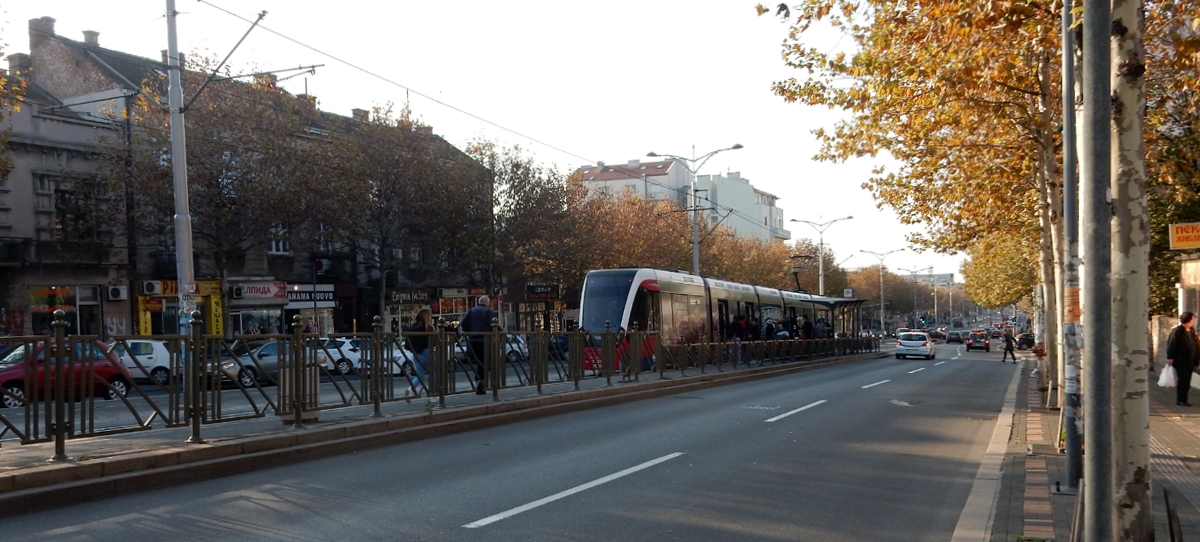 Image: Main boulevard near my place.
Image: Main boulevard near my place.
Logistics
Serbians use two alphabets – Latinic (which English is written with) and Cyrillic, both of which are used on signs throughout the city. The spoken Serbian language can be written using either alphabet. You’ll find a big range of English proficiency spoken in Belgrade.
Public transportation
If using public transit, you’ll need to purchase a card in advance as it’s not possible to pay in cash when you board the buses/trams. Public transit cards are sold at little kiosks along the street, they’re very easy to find. You can purchase an “unlimited rides” pass for a number of days, or purchase and put money on a “rechargeable” card. The bus/tram stops are very well labeled in Belgrade with a symbol and bus/tram numbers on a sign. Super convenient!
The Serbian public transportation system is a combination of above-ground trams and buses – the transit card allows you to use both. You’ll need to swipe your card on the little machine near the door when you enter. If not traveling with an “unlimited rides” pass, you have 90 minutes to make as many bus/tram changes as you’d like after the first card swipe. No need to re-swipe your card for every new bus/tram you enter afterwards, just keep track of time and make sure you’re still within your 90 minutes.
Oddly, Google Maps (which I’ve relied on for public transportation in all other cities so far) doesn’t entirely work in Belgrade. It’s possible to see the bus/trim routes, but not information about time or best routes between two locations. Fortunately, there’s another app which does exactly that called MoovIt. Technology to the rescue once again! I ended up using a combination of both for navigation. Google Maps was more helpful searching for destinations in English, but MoovIt was needed to show me how to actually get there.
What’s interesting about the buses/trams in Belgrade is that there’s a huge mix between very modern and pretty ancient vehicles, both of which run on the same rails and wires.
SIM Cards
This was the first country where my EU phone plan didn’t apply so I ended up getting a local SIM card. The process was amazingly fast and easy! There are many, many shops selling phone related stuff all over Belgrade, so finding a place to purchase one wasn’t difficult. I chose a data-only pack (without a phone number) since was planning on using my phone primarily for map, public transit schedules, and (let’s be honest) social media amusement. I also knew that I could use the data to make calls using apps such as Skype. I paid about $5 (USD) for 10GB of pre-paid data which expired in 2 weeks, which by US standards is just insane!
Weather
I arrived in November and stayed for the entire month. The first two weeks were sunny and warm-ish (light sweater weather), which everyone said was very unusual for November. Midway through the month and again towards the end it became true winter, complete with freezing temps, overcast skies and even a little snow. I hate the cold, but having lived in the desert for so long, was delighted to see the falling snow! Christmas markets don’t seem to be a thing in Serbia but there were white, red and blue holiday lights all along the main boulevard of my neighborhood. Downtown was also filled with cheerful holiday decorations, lending a cozy winter ambiance to the city.
Food
Belgrade has a lot of great restaurants of many different kinds of food for VERY cheap, considering the great quality and generous portion sizes that you get!
I asked my AirBnB host for a recommendation of where to try traditional Serbian food. She told me that the only way to truly experience this was with home cooked meal, and returned a couple hours later with freshly-cooked food: sarma (cabbage wrapped meat) and rolled pastries with a nut filling. I had the opportunity to try many more of her home-cooked meals throughout my stay, all of which were amazing! One of my favorite was stew made of white beans, beef on the bone and veggies – the perfect meal for staying warm on a chilly winter day!
Desserts!
Serbian desserts consists of a variety of thin filo or breaded dough pastries with nut and/or fruit filling. My two favorite desserts were Bundevara and Zapečene palačinke. Bundevara is a pastry made with flaky layered filo dough rolled with a squash filling that tastes like pumpkin. Zapečene palačinke is a cake made of many rolled up thin pancakes (similar to Belgian crepes) with a sweet nut and cinnamon vanilla sugar filling. SO GOOD!
 Images: (left) Bundevara (middle) pastries with a fruit filling I couldn’t identify, possibly fig? (right) Zapečene palačinke home cooked by Ivana, one of my training partners Kimura Academy! I was touched her thoughtfulness, and thrilled to have gotten the chance to try so many authentic home cooked Serbian foods during my stay!
Images: (left) Bundevara (middle) pastries with a fruit filling I couldn’t identify, possibly fig? (right) Zapečene palačinke home cooked by Ivana, one of my training partners Kimura Academy! I was touched her thoughtfulness, and thrilled to have gotten the chance to try so many authentic home cooked Serbian foods during my stay!
Tourist Time!
Belgrade Fortress
Not far from the city center is the Belgrade Fortress. This area consists of the Kalemegdan Park and the ruins of the walls and towers of what used to be the Belgrade fortress, on top of a cliff overlooking the city. There’s a great view of the city and two rivers (the Sava and the Danube) converging.
On the warmer days I went here it was quite lively – people walking dogs, families with kids out for a stroll, vendors selling popcorn and roasted chestnuts, old men in groups playing games of chess on stone tables, and other sightseers taking photos of the panoramic view and posing with their friends and sweethearts.
This area also includes a very nicely maintained collection of tanks from different time periods (free to look at!), a military museum, a natural history museum (with collection of really nice life-sized dinosaur sculptures), a small church, a playground, some nice outside sculpture, and a zoo. Probably a great place to bring the family, if you need something that will satisfy a wide range of interests and ages.
Market
There happened to be a medium sized fruit market within a 10 minute walks from my place which offered a very nice range of fresh fruits, veggies and nuts locally grown. Here I discovered that Belgrade has exceptionally great pomegranates, which initially seemed odd to me because I’d (incorrectly) always thought of these as a tropical climate fruit. In the side streets next to the food market were little shops selling fresh breads, meats and cheeses. There was also a section where vendors sold a variety of non-food items, mostly household products and items, but also some clothing. So, instead of going to one giant grocery store for shopping – here was one big area where you could purchase everything from many different little local stores/stalls!
Park Forest Zvezdara
I went for a stroll here hoping to catch a glimpse a fire salamander, slow worm (a kind of legless lizard, which is not a snake), or one of the protected northern white-breasted hedgehog but unfortunately did not see any wildlife, probably because it was winter. This forest might seem quite bland and ordinary to people who live in wooded places but to someone as myself who’s lived a long time in the desert, in a city of eternal summer – any trees with falling leaves and seasons are pretty great! It was a nice break from the concrete and noise of the city.
One word of warning – there are some stray dogs here. I ran into a pack of six which fortunately didn’t attack, but were rather intimidating barking and following along for a bit. Unlike strays I’ve seen in cities in the past – these were not small malnourished animals, and seemed like really healthy and fit dogs. I was later given the tip that bending down like you’re picking up a rock will scare off stray dogs anywhere, as they’re used universally accustomed to having things thrown at them. I haven’t put this to the test myself, and certainly hope not to end up in a situation like this again!
Beautiful Churches
There are many beautiful and very well maintained churches throughout Belgrade, most of them Orthodox Christian as that’s the dominant religion of the city. The insides are calm and quite, the walls and ceilings densely filled with beautiful brightly colored paintings of saints and scenes from the bible.
There are a couple differences between Orthodox Christian churches and churches of other branches of Christianity which I’ve seen in the past. The main room is empty instead of being filled with rows of chairs or benches, as people stand instead of being seated for service. There’s often a large open book or painting toward the center front of the main room, which followers can kiss, pray, or make donations to. And, there’s a large very ornate crown chandelier hanging over the center space, lit with candles and sometimes also decorated with pictures of saints. Long stemmed candles can be purchased as offerings, to be lit and placed in alter boxes of sand and sometimes water.
I also learned that Orthodox Christians celebrate Christmas on January 6-7 instead of December 24-25. This has to do with how dates are arranged in the Gregorian calendar vs. older Julian Calendar.
The Church of Saint Sava is actually very new – construction began 1935 and is still ongoing today. The crypt section is open for visitors already, and is absolutely magnificent! While I’ve seen a great many beautiful churches in other countries throughout my travels – it’s rare to me to see one so modern with stone work and paintings so vibrant and crisp, not yet having weathered and faded by the passage of time.
 Image: An assortment of different churches/chapels.
Image: An assortment of different churches/chapels.
1999 Nato Bombings
In 1999, Belgrade was bombed by Nato. Some of the buildings that were destroyed have been completely rebuilt and replaced by new buildings. Others remain abandoned and neglected in their partially ruined state, big gaping holes exposing the interiors where the bombs landed.
I won’t get into the politics behind it, why it happened, and whether or not it was justified (you can research that yourself and find much better, more details explanations that I could possibly provide, then draw your own conclusions).
What I will say is that walking through the city, so modern and lively, full of people not unlike myself – it’s astounding to think that it happened here, really not THAT long ago. When you seen news of war and conflict on television happening in far off countries – it’s sometimes easy to feel removed and disconnected, especially if it it doesn’t impact your own world in any meaningful way. Seeing the ruins and hearing the firsthand accounts of people who lived in the countries where these events happened makes them real in a way that they weren’t before.
The more I travel, the more I realize how similar people of all parts of the world are, with the same basic hopes, fears, worries and dreams. That is, perhaps, one of the positive effects of traveling – it makes you better able to relate to the rest of humanity.
Image: Ruins of two of the buildings that were bombed in 1999
Training
Though BJJ is still fairly new to the Serbia – there is certainly no shortage of places to train in Belgrade! I had the opportunity to visit the following 5 gyms in the time that I was here.
GIANT thanks to everyone who welcomed me to come visit and train at their gym – to the instructors and to my training partners! I leave with many great memories of the city, and of the BJJ community here.
This was my “home gym” in Belgrade for the month I was here, very conveniently (intentionally) located just 10 minutes away from my AirBnb place by foot! It’s run by Guillaume Huni (1st degree black belt) and is a BJJ Globetrotters affiliated gym.
I really can’t say enough good things about Kimura Academy! Super friendly and welcoming atmosphere, great level of technical skill, physical strength and general enthusiasm for BJJ. It’s a very international and traveler friendly gym – in the time that I was there, a handful of other visitors from neighboring countries dropped in as well.
Through amazing good luck, there was also a seminar by Clark Gracie hosted here the second week of November while I was in town! It was a great seminar, with students attending from many of the neighboring gyms as well. I was unfortunately too shy to ask for a photo with Clark Gracie, so… missed opportunity there!
Image: Guillaume Huni, me, Ivana, instructors Nikola and Mirza. Ivana was my most regular training partner, and also led the group in yoga-style stretches after class some days, which I thought was a really nice way to wrap up a BJJ class. Her bright cheerfulness and ability to quickly pinpoint what adjustments were needed in my technique made her a pleasure to train with! This may have been one of the last photos taken of Ivana as a white belt, since she receive her (much deserved) blue belt shortly after!
The building itself where this gym is located very interesting history. It was constructed around 1940 as a printing press for the National Printing Institution of Yugoslavia. It fell into disuse and became abandoned for awhile when the economy tanked, then later became used by artists, designers, musicians and nightclubs, then some time later declared a national monument by the state. Currently, the inside spaces are rented variety of different businesses… like BJJ!